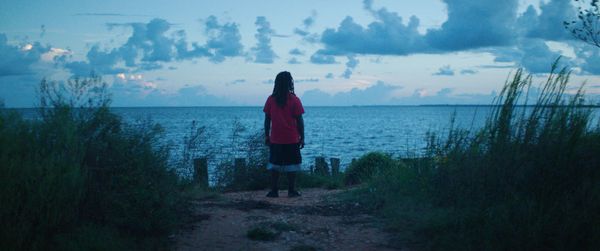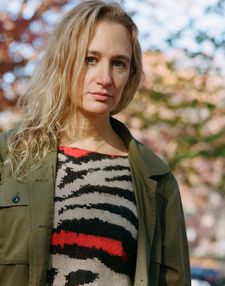 |
| Emmett Lewis in Descendant. Margaret Brown: 'They were used to fighting and used to like being ignored and, but still fighting anyway. It's pretty amazing. And so I wanted to amplify that story' |
Margaret Brown’s Descendant has just won the US Documentary Special Jury Award for Creative Vision. It considers the history of Africatown community in Mobile, Alabama, which was founded by the descendants of enslaved people who were transported on The Clotilda, the last known slave ship, in 1860. As the community considers the possibility that the wreck of the ship might be found, Brown’s film opens out into a rumination on the importance of history, not as a thing in a museum to be looked at and forgotten, but as a living and breathing thing that is folded into our present.
Brown grew up in Mobile herself and says she wasn’t aware of The Clotilda as a child, although the story coalesced for her when she was working on her 2008 documentary The Order Of Myths, although she says: “I feel like, I must have known about it a little bit before that but it was almost like a myth or a or a rumour. It wasn't like white people would say, Oh, the Meaher family did that and it wasn’t really talked about openly. It was like a whisper campaign.”
 |
| Director Margaret Brown: 'I've never had such a collaborative experience' Photo: Roeg Cohen |
That idea of something being there without people properly noticing it is something that runs through the film, not just in the case of the ship that has lain in the water for more than 100 years but also the book Barracoon, which was written by Zora Neale Hurston based on interviews she took with Cudjoe Lewis, a survivor of The Clotilda, in 1927 but which wasn’t published until 2018.
Brown says: “What's fascinated me about the South is the sort of way whiteness is performed. What being white means and, and how you separate people through this construct and that’s how, on some level, I came to the movie, even though the white people wouldn't talk to me. There's this deep shame among white people in the south. And I think the rise of Trump is really connected to this, like: you deny, you deny, you deny, so you don't have to confront. I thought a lot of these white people would speak to me, because they had for The Order Of Myths. And then when it came to this movie, they didn't. When money comes into it, people shut up and then I guess The Order Of Myths was more about Mardi Gras gowns than money.
Did it come as a shock to her that people she’d spoken to previously refused to go on the record this time?
“Well, it was and it wasn’t,” says Brown “because they didn't talk to anyone else either. But I did think like, ‘Oh, surely like Helen Meaher, who was in The Order Of Myths, will speak to me’. I thought, ‘I have this key to the story that no one else might have’. The film you intend to make is never what you make. So you live with the hand that you're dealt, but I did think that because I had access or supposed access that I would I would be a good person to tell a version of the story. But that didn't turn out to be true.”
She adds: “It's a story about a community and… my whiteness, I was like, fuck, what am I going to do? I’m a privileged white woman telling the story, this is not a situation I really want to be in when the Meahers wouldn't talk to me.”
But she says she was inspired by the activism in the community and let them take the lead, saying “the people in the film taught me so much”. She adds: “A film tells me what to do sort of and this film was like, 'Listen, just listen, just listen, just listen'. And that's sort of what I tried to do the whole time.”
Admitting she can be “pretty stubborn and strong willed, she adds: “I've never had such a collaborative experience.”
The film considers the complexity of the situation surrounding The Clotilda, with some concerned that it might become the wrong kind of symbol. It put me in mind of the sort of troubling tourism that is sometimes discussed with regard to Belfast’s “peace walls” or the Nazi death camps.
Brown says: “I think museums, and these things are important artefacts that connect us to some kind of truth about our past. And they illuminate things that have been hidden. But, yes, it's like, who has control over that story? Will it be the people who it spiritually belongs to? Or will it be the city who just ignored them in most ways until there was money to be made? And is it able to change its course and do something for this community? The city has some choices to make and the community has some choices to make? And that's kind of where the film ends – you see this could really go either way. What are we going to do about this as a community, as a country – this is something that's happening everywhere.”
 |
| Africatown. Margaret Brown: 'I wanted to end it in a place where you'd walk out of the theatre, and be like Anderson says in the film, ‘What do you do when you leave?’ |
The film also goes beyond the way that racism can be overt to the way it has become more covert over time, affecting things like land zoning, with heavy industry surrounding Africatown. Brown says that’s something that the community have been aware of and fighting all along.
She adds: “When I go to Africatown, there’s so many community groups, it's very inspiring. This was more about the interweaving of past and present. Four years ago, when we started going to all these meetings, I was like, ‘Who are these 70 and 80-year-olds who just go to activist [meetings] all day, this is so inspiring. There were young people too, but it's just really inspiring, the resilience and the struggle. It was kind of mind blowing. It just made me wonder what else I was missing. What else do I need to be quiet and listen for? Because this is happening in my hometown. I mean, granted, I live in Austin, Texas now, don't live in Mobile. But, I mean when I was a teenager, I would go to meetings and stuff, like for different causes or whatever. I was a good little punk rock kid. But this was beyond that I was just like, ‘Damn, these people are organised’.”
It’s a situation that just goes to show how much effort needs to go into activism in order to achieve a result.
Brown says: “They were used to fighting and used to like being ignored and, but still fighting anyway. It's pretty amazing. And so I wanted to amplify that story.”
I wonder how easy it is, when a story becomes as complex and detailed as this one, taking in considerations of what might happen if The Clotilda is found along with other issues affecting the community around land zoning, how easy it is to know when to turn the camera off and start editing.
Brown says: “Covid really influenced that. And it was weirdly providential because I think I would have finished a long time ago. First of all, when you're making a movie, you have a certain amount of money and so you can't just shoot it forever. So there's that. Then Covid happened and a lot of my characters are elderly people in a neighbourhood that is not really taken care of, and I just didn't want to put them at risk. So for a while, we just didn't film or we filmed with younger people and we filmed them outside. It becomes less intimate then. But luckily, at that point, it was two and a half, three years in.
“My film is a drop in the bucket of this topic. I just think there's more questions and answers. And I think, as a society, we need to grapple with those questions. And I wanted to end it in a place where you'd walk out of the theatre, and be like Anderson says in the film, ‘What do you do when you leave?’ If you're moved by these people, now what are you going to do about it? These are conversations in the United States, and probably worldwide, that are really hard to have. They're very painful, they're very triggering. Um, I just hope my film can be part of that conversation. We see the community hopeful, but also distrustful. And we see the city in a point where they could make some right choices for once, it's a good place to leave it, because people can watch it and be like, I want to get involved. I want to go down there. Or maybe not even go down there but contact the groups that are in the movie and say, ‘Hey, how can I be an ally to you?’”
She adds: “The work of the film is just starting in a way, like we made it for four years and now we see what work can the film do? What happens now is just a continuation of what's been happening, except now more people can hopefully witness this and feel it.”





















